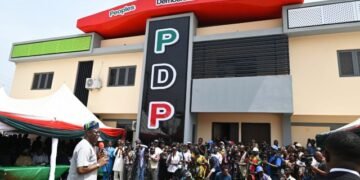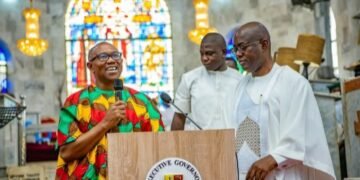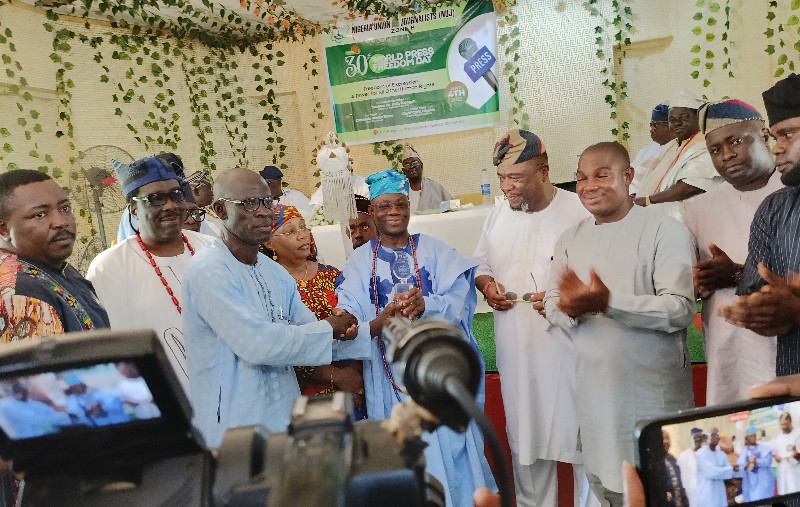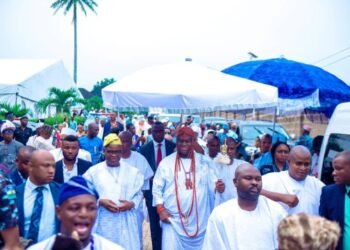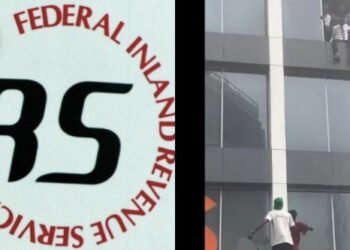I have welcomed the opportunity to deliver this lecture principally for two reasons: Because I am an uncompromising advocate of freedom of expression;
The second reason has to do with my hope and belief that, if we continue to work at it, the Nigerian media will eventually become one of the best in the world.
We have produced and still producing highly professional men and women of courage and conscience; those with the courage to stand up, when necessary to one’s associates, the courage to resist public pressure as well as private greed.
While pondering on the theme of this lecture, freedom of expression as a driver for all other human rights, I felt the need to establish the nexus between what may be considered as mere freedom of expression as a driver for all other human rights-
The right to vote; the right to life and liberty; freedom from slavery; freedom of religion; right to education and all other basic human rights.
Ladies and gentlemen, permit me to take us down the memory lane of the struggle of the American Negro to freedom and liberty as captured on Page 206 of the Autobiography of Martin Luther King JR., edited by Clayborne Carson.
“Children Understood The Stakes”
“Southern Christian Leadership Conference (SCLC) staff members James Bevel, Andy Young, Bernard Lee and Dorathy Cotton began visiting colleges and high schools in the area. They visited students to attend after school meetings at churches.
“The word spread fast and the response from Birmingham’s youngster exceeded our fondest dreams, by the fifths and by the hundreds, these youngsters attended mass meetings and training sessions. They interned eagerly as we talked of bringing freedom to Birmingham, not in some distant time, but right now.
“We taught them the philosophy of non-violence. We challenged them to bring their exuberance, their youthful creativity into the disciplined dedication of the movement. We found them eager to belong, hungry for participation in a significant social effort.
“Looking back, it is clear that the introduction of Birmingham children into the campaign was one of the wisest moves we made. It brought a new impact to the crusade and the impetus that we needed to win the struggle.
“Immediately, of course, a cry of protest went up.
“Although by the end of April, the attitude of the national press had changed considerably, so that the major media were according us sympathetic coverage, yet many deplored our using our children in this fashion.
“Where had these writers been, we wondered, during the centuries when our segregated social system had been misusing and abusing Negro children?
“Where had they been with their protective words when, down through the years, Negro infants were born into ghettos, taking their first breath of life in a social atmosphere where the fresh air of freedom was crowded out by the stench of discrimination?
“The children themselves had the answers to the misguided sympathies of the press. One of the most ringing replies came from a child of no more than eight who walked with her mother one day in a demonstration.
“An amused policeman leaned down to her and said with mock gruffness; “What do you want”? The child looked into his eyes, unafraid, and gave her answer: “Freedom”, she said. She could not even pronounce the word, but no Gabriel trumpet could have founded a truer note.”
And So Where Am I Dragging Us Into?
Distinguished guests. The whole essence is to remind us of how such movements – whether they occurred in Nelson Mandela’s South Africa, Robert Mugabe’s Zimbabwe. The Arab Springs in Egypt, Gobarchev’s Glasnost and Parastroika, the June 12 1993 crisis in Nigeria or even the #EndSARS.
The significant point of convergence is the capacity of the freedom of expression to walk us through doors of opportunities which hither-to would have been impossible.
The Freedom To Speak Out And Speak Truth To Power
The Southern Christians Leadership Conference (SCLC) Birmingham experience, that I referred to is just one of the perfect testimonies to the fact that eventually the forces of justice and the struggle for the attainment of the basic human rights will always triumph in the universe and this is because the universe itself is on the side of freedom and justice.
Nonetheless, freedom of expression was the catalyst that gave birth to freedom from Colonial Rule in Africa and Asia. It is the driver of all other human and civil rights in America. It is the primary factor that gave Nelson Mandela’s South Africa the rights to vote, the collapse of apartheid regime and the attainment of all other civil rights all over the world.
In Yoruba land. It is said that aile soro ni ibere oriburuku. And, of course, we have learnt from Professor Wole Soyinka’s Prison Notes that the man dies in all who keep silent in the face of tyranny.
Freedom of expression is the gift of nature to human race. You don’t need to wait for anyone to give it to you. It is already in our spirit and all you need to do is release it to make a difference.
Recall those protesters in Tagri Square, Egypt who spoke with one voice about the corruption of the government, its inability to deliver public services, and the lack of equality of opportunity in their country. They complained about repression and the lack of political right in their country.
Egyptians and Tunisians both saw their economic problems as being fundamentally cause by their lack of political rights and they confronted it head on by the freedom to express themselves and bring about the desired change and enthronement of their fundamental human rights.
People must fight for and win more political rights from the power elite and the best way to do it is by freedom of expression.
To make progress in any civil society, citizen must use their natural right of freedom of expression to secure their right to vote and be voted for and overthrow the narrow selfish political elites who control power and refuse to create a society where political rights are broadly distributed; where the government must be accountable and responsive to citizen and the great mass of people could take advantage of economic opportunities.
Democracy is about freedom to express ourselves within the confines of the law. It is about freedom to hold membership of any political party of our choice and to practice the religion of our choice. It is about open air public rallies, without being necessarily answerable to the Department of State Security.
Let us imagine for a moment what would have become of the American Democracy had the mainstream American Media not confronted head on the scourge of Donald Trump’s temperament better suited to an asylum than to the oval office;
Think of where the Federal Republic of Nigeria would have been, had the Nigerian media not work in concert with NADECO, the Labor Unions, students, and other human rights organisations.
Freedom of expression is a natural freedom. It is difficult to suppress. It is one human spirit impossible to kill. It is the reason that United Nations General Assembly has invested and still investing much of its time and resources on inventing so many legal frame work to guide our national conduct.
It is the reason for the Universal Declaration of Human Rights (UDHR), which has been described as a milestone document in the history of human existence.
It was drafted by representatives with different legal and cultural backgrounds from across the regions of the world and proclaimed by the United Nations General Assembly in Paris on 10 December, 1948. General Assembly Resolution 217, co-existence for all people and as a common standard for all nations.
The UDHR sets out, for the first time, fundamental human rights to be universally protected. The UDHR is widely recognised and it has paved way for adoption of more than 70 human rights treaties, applied today on a permanent basis at global and regional levels, Nigeria inclusive.
Nigeria, in recognition of the inherent dignity, equal inalienable rights for all members of the human family has, by virtue of Chapter Four, Section 33-46 of the Constitution of the Federal Republic of Nigeria, 1999 (as amended), made provisions for the fundamental human rights of her citizens.
These fundamental human rights, as enshrined under the Constitution of the Federal Republic of Nigeria, pertains to life; dignity of human person; personal liberty; fair hearing; private and family life; freedom of thought; conscience and religion; freedom of expression and of the press, peaceful assembly and freedom of association, freedom of movement; freedom from discrimination, etc.
However, freedom of expression underpins other human rights such as the right to freedom of thought, conscience and religion and allows them to flourish.
It is also closely linked to freedom of association- the right to form and join clubs, and freedom of peaceful assembly -the right to take part in a peaceful demonstration or public meeting. These rights come under regular attack by bodies that want to stifle criticism.
Article 19 Of The UDHR
The right to freedom of expression, as enshrined in Article 19 of the Universal Declaration of Human Rights, states broadly that “Everyone has the right to freedom of opinion and expression. This right includes freedom to hold opinions without interference and to seek, receive and impart information and ideas through any media and regardless of frontiers.”
Section 39 (1) of the Constitution Of The Federal Republic of Nigeria, 1999 (as amended), provides inter alia: “Every person shall be entitled to freedom of expression, including freedom to hold opinions and to receive and impart information without interference.”
Article 19(2) of the International Convenant On Civil And Political Rights (ICCPR), 1966 makes its own provision to the effect that “Everyone shall have the right to hold opinions without interference.
“Everyone shall have the right to freedom of expression; this right shall include seeking, receiving and imparting information and ideas of all kinds, regardless of frontiers, either orally, in writing or in print, in the form of art, or through any other media of his choice.”
Various international human rights instruments and local legislations make succinct provisions on the freedom of expression. This is because freedom of expression is the driver for all other human rights.
It is essential, if man is not to be compelled to have recourse as a last resort to rebellion, human rights must be protected through freedom of speech and expression without any form of interference and without fear.
Freedom of speech and expression is broadly understood as the notion that every person has the natural right to freely express himself or herself through any media and frontier without outside interference, such as censorship, and without fear of reprisal, such as threats and persecutions.
Freedom of expression is a complex right. This is because freedom of expression is not absolute and carries with it special duties and responsibilities, therefore it may be subject to certain restrictions provided by Law.
The term, ‘freedom of speech and expression’, includes any act of seeking, receiving and imparting information or ideas, regardless of the medium used.
Freedom of speech is understood as a multi-faceted right including not only the right to express or disseminate information and ideas but also including the right to seek, receive and impart information and ideas.
The notion of freedom of speech and expression is intimately linked to the concept of democracy.
Democracy means self-government by the people and for the proper functioning of which, an informed electorate is indispensable which, in turn, requires that there be no constraints on the free flow of information and ideas.
Democracy will not be true to its essential ideal if those in power are able to manipulate by withholding information and stifling criticism. The value of freedom of speech and expression lies within social interactions.
However, the freedom of speech and expression does not confer on the citizens the right to speak or publish without responsibility and the Legislature may enact laws to impose restrictions on the right to speech and expression on several grounds.
Article 19(3) of the ICCPR for instance, imposes restrictions on the following grounds:
(a) For respect of the rights of reputations of others;
(b) For protection of national security, or public order, or public health or morals.
Nigeria’s constitutional framework on freedom of opinion and expression and other associated rights to freedom of conscience and thought as well as the freedom of the press is in compliance with international standards.
Section 39 of the Constitution of the Federal Republic of Nigeria, 1999 provides inter alia: “Every person shall be entitled to freedom of expression, including freedom to hold opinions and to receive and impart information without interference…”
Notably, the enactment of the Freedom of Information Act (2011) in Nigeria has enhanced the enjoyment of rights to freedom of information thereby strengthening people’s right to opinion and expression.
However, a global fundamental challenge in need of urgent resolution in the digital age is how to protect human rights and freedom on the internet and Nigeria is no exception.
Access to the internet is increasing rapidly all over Nigeria with millions of people getting online and engaging on a wide range of issues on social media and other digital platforms including political matters, social and economic development among others.
With the development and popularity of social networking sites, cybercrimes have immensely increased. It has become necessary to prioritise the issues and make strict laws with the developing technology.
Social media come with potential problems, as well as gains. This new phenomenon presents us with a range of fresh challenges. One important issue is how to ensure that Internet regulations do not strangle freedom of expression.
“Blocking’, for example, is nowadays frequently used to prevent specific content from reaching a final user. However, the indications are that this method is not efficient in preventing, for example, human rights violations on the internet.
Furthermore, who should decide what is to be blocked, and what processes and remedies should this be subjected to?
In this connection, the report from the UN Special Rapporteur provides guidance that, on the important issue of the censorship of alleged support for terrorism, restrictions on the right to expression can only be justified if the government can demonstrate that the expression is intended to incite imminent violence, and that there is a direct and immediate connection between this expression and the likelihood or occurrence of such violence.
The 2011 Report of the UN Special Rapporteur on Freedom of Opinion and Expression is a strong statement of the importance of freedom of expression on the Internet. The Rapporteur emphasizes the need for clear rules, in contrast with the arbitrariness.
Like other parts of the world, there are ongoing efforts in Nigeria to adopt policies, regulations or laws to regulate and control the social media. There is legitimate desire by government to curb criminal activities online, particularly financial crimes and terrorist activities.
However, there is sustained advocacy to ensure that this does not result in curtailment of meaningful/constructive criticisms of government or institutions.
Limitation on access to online media content may constitute serious restriction on freedom of expression except it is justified by strictly complying with national, regional, and international human rights standards.
Remarkably, in an attempt to regulate the content of the social media, the eighth Senate of the Federal Republic of Nigeria undertook preliminary consideration of a Bill that sought to stifle social media activities – “The Frivolous Petition (Prohibition, etc.) Bill 2015”.
The Bill was passed for first reading November 24, 2015 and passed for second reading on December 2, 2015. However, it did not enjoy broad support of the members of the public So, media and civil society organisations protested against the bill tagging it as “Anti-Social Media Bill” and thus the Senate was forced to withdraw it in 2017.
There are however existing legislations in Nigeria aimed at regulating online content to some extent. These include: The Cybercrime Act, enacted in 2015 to enhance national cyber security and for the prevention, detection, response and prosecution of cybercrimes and other related matters.
Among others, It criminalises several illegal activities, including hacking, system interference, unlawful interception, computer related forgery, fake electronic or verbal messages by staff or agents of financial institutions, identity theft or fraud, electronic theft, etc;
The Terrorism Prevention Act (TPA) 2011 as amended Similar to Cybercrime Act, the Terrorism Prevention Act 2011, inter alia, provides for intelligence gathering through the lawful interception of communications;
NGO Regulation Bill. A private member Bill was also introduced in the Nigeria’s House of Representatives tagged “NGO Regulation Bill’. Even though not directly targeted at social media regulation, The civil society condemned the Bill by opposing it vehemently during the public hearing of 13 December, 2017. Part of the grounds for opposing the bill was that it sought to stifle civil activism.
While acknowledging the importance of regulating the Social Media against crime and to protect users of the social media; there is an overwhelming need to pursue the discussion about how to ensure protection of individual’s integrity (data protection) in the Social Media without undermining the right to freedom of expression in Nigeria, and indeed globally because human rights standards are of universal application.
Preventing Sectoral Corruption In The Media
Freedom of expression and freedom of the media are Siamese Twins. Media platforms are free when there is a deliberate attempt to ensure that freedom of expression is guaranteed in human societies.
Media are a platform for wide-ranging debates on war and peace as well as freedom from tyranny. Freedom of expression and media are what we need to strengthen our democracies and tear down the walls of tyranny and bad governance across the globe.
A democratic media is needed because it gives us hope and chronicles the movements and organisations that are making history. It gives voice to the voiceless and encourage people to get involved in their struggles to make a difference.
Social change will not come from the minds of the Commander-in-Chief, the Generals or Mr. President. In fact, change is vulnerable to blockage by the powerful. Change begins with active common citizens, working in their communities.
The media should not have to agree with persons or groups, government or the most powerful. It is the media responsibility to include all voices in the discourse and then allow the people to decide.
Our democracy is going through a wobbling evolution. If we continue to work at it, we will get to the promised land, no matter how long it takes. But this is not achievable without a vibrant, highly professional and ethical media platforms devoid of sectoral corruption.
Attractive remuneration and welfare package is the way out. Media educational institutions must be well funded and personal security of the practitioners be guaranteed. If media practitioner’s welfare is not a priority, journalist will cut corners and compromise the standard of objectivity.
Distinguished Ladies and gentlemen, by the power conferred on me by the Nigeria Union Of Journalists – B-Zone- South-West State Councils, I so submit.
I thank you for your attention.
•Being a lecture delivered by Senator Muhammed Kola Balogun, the Guest Speaker at the 30th edition of the World Press Freedom Day, held at the NUJ Press Centre, Iyaganku GRA, Ibadan, Oyo State on 4 May, 2023.


